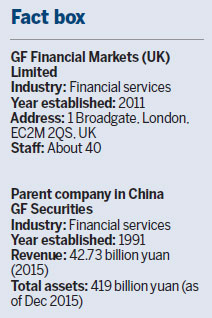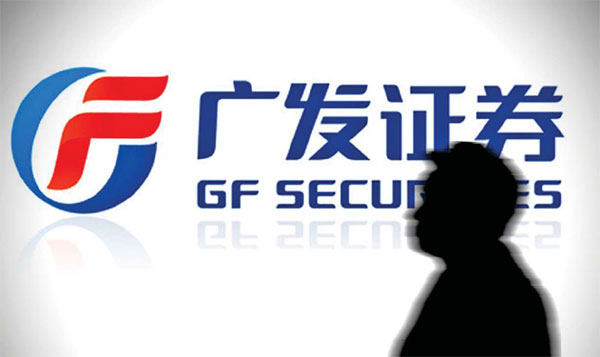In London, Chinese firm dives into the commodity market
Guangzhou-based GF Securities confident about profitability in hedging
Leading Chinese securities firm GF Securities is rapidly expanding in London's commodities and derivatives trading space at a time when Western banks are reducing these activities to focus on core banking business.
The firm, China's third largest securities firm by assets, based in Guangzhou, Guangdong province, saw its London activities take off in 2013 when it bought French bank Natixis's commodities trading unit for $36.1 million, gaining significant commodities trading expertise.
In the same year, it joined London Metal Exchange as a ring member, meaning it forms a part of a group that deals in metals via orders shouted across a 6-meter-wide ring of computer workstations.
|
GF Securites saw its London activities take off in 2013 when it bought French bank Natixis's commodities trading unit. Provided to China Daily |
Edward Shi, managing director of GF Financial Markets (UK), the UK subsidiary of GF Securities, said the firm's participation in London's commodities trading follows demand from Chinese clients - large-scale commodity producers that require financial products that can hedge their risks. Chinese state-owned consumers and producers of agricultural products, metals and energy resources need to fix their products at predetermined prices in the futures market to help them dampen future price fluctuations.
Western banks are retreating from the commodity trading space because of declining profitability in the sector and increasingly stringent financial regulations in the wake of the 2008 financial crisis.
Most of these regulations demand stricter capital requirements for banks and limit proprietary trading by them.
In 2014, Barclays said it would give up most of its metals trading, and JPMorgan agreed to sell its physical commodities business to Mercuria, a Swiss commodities trading firm. Morgan Stanley is also seeking to sell its oil-trading assets.

GF's asset base allows it to stand strong in this market. Shi is confident about profitability, citing China's large market demand for commodity hedging through financial products.
He says most of GF's current clients for commodity trading are state-owned Chinese producers and consumers of commodities. Increasingly, however, private firms are also seeing a need to hedge exposure. Chinese financial traders looking to profit from commodity trading are an important client segment.
In addition to commodities trading, GF was recently licensed to operate in the financial derivatives market, meaning it will execute trades in products like foreign currency and stock index futures.
Financial derivatives are particularly important in a turbulent market where prices change frequently. For example, foreign exchange derivatives can help Chinese exporters reduce currency exposure in their international trades.
GF has also just received an asset-management license in the UK. With this license it will use its quota under the RQFII scheme (Renminbi Qualified Foreign Institutional Investor) to help Western institutional investors buy into China's stock and bond markets, which are otherwise restricted.
Those markets are particularly attractive because of good returns. In recent months the Chinese government announced various initiatives to loosen its capital account controls to support the renminbi's internationalization.
Valued at about $7 trillion, China's interbank bond market is currently the third-largest in the world, following the US and Japan. Restrictions mean that foreign participation so far stands at about 2 percent.
GF Securities group, established in 1991, has grown quickly to current total assets of 419 billion yuan ($62 billion; 56.5 billion euros; 51 billion) as of December 2015 and generated revenue of 42.73 billion yuan in 2015.
In 2010, GF Securities was listed on the Shenzhen Stock Exchange, and last year it was listed on the Hong Kong Stock Exchange, raising a record of $3.6 billion. It was the largest IPO ever for a securities firm at the time of listing, according to Goldman Sachs, one of the lead underwriters.
The listing was a significant moment that reaffirmed its international strategy because, at the time, the company promised investors to apply 30 percent of funds raised to international expansion.
With overseas offices in London and Vancouver already, GF Financial Markets' future speed of internationalization is set to strengthen, and London is an important destination, Shi says.

"Our growth strategy is to first ensure that we control risks efficiently, and then we increase our activity to a larger scale and diversify it," he says.
GF established its London office in 2011. In recent years other Chinese securities firms, such as CITIC, Haitong and China Merchants Securities, have all followed in its footsteps in the UK.
Shi says he sees GF's key advantages as its brand effect and its abundant talent. The brand effect derives from its parent company's large asset size, which gives customers trust. Its abundant talent comes from good retention and integration of the existing talent base at Natixis Commodity Markets and its subsequent hiring of traders, most of whom already have experience at Western investment banks.
As a testimony to its high level of localization, 85 percent of approximately 40 staff members in the UK were hired locally.
In addition, Shi says GF has a unique company culture marked by team efforts and trust.
"Our management has strong trust in employees, and our headquarters has strong trust for overseas subsidiaries. We champion teamwork and put clients and shareholders first," he says.
Despite its achievements, Shi says GF Financial Markets needs talent for its rapid domestic and international expansion, adding that this will need time to build up.
cecily.liu@mail.chinadailyuk.com
(China Daily European Weekly 11/04/2016 page29)























